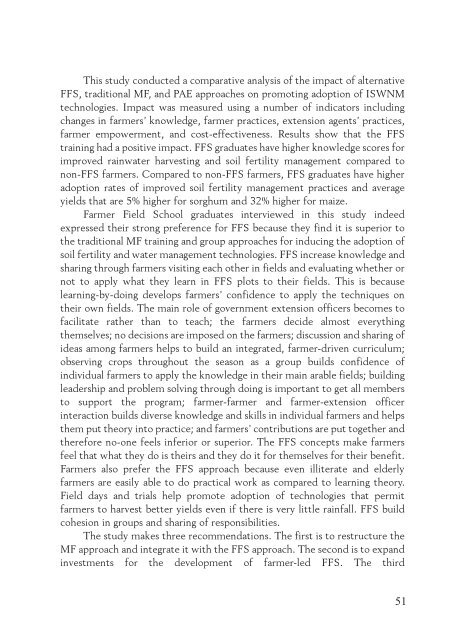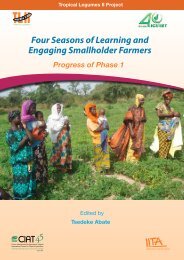Integrated Soil Water and Nutrient Management and Dry ... - Icrisat
Integrated Soil Water and Nutrient Management and Dry ... - Icrisat
Integrated Soil Water and Nutrient Management and Dry ... - Icrisat
Create successful ePaper yourself
Turn your PDF publications into a flip-book with our unique Google optimized e-Paper software.
This study conducted a comparative analysis of the impact of alternative<br />
FFS, traditional MF, <strong>and</strong> PAE approaches on promoting adoption of ISWNM<br />
technologies. Impact was measured using a number of indicators including<br />
changes in farmers’ knowledge, farmer practices, extension agents’ practices,<br />
farmer empowerment, <strong>and</strong> cost-effectiveness. Results show that the FFS<br />
training had a positive impact. FFS graduates have higher knowledge scores for<br />
improved rainwater harvesting <strong>and</strong> soil fertility management compared to<br />
non-FFS farmers. Compared to non-FFS farmers, FFS graduates have higher<br />
adoption rates of improved soil fertility management practices <strong>and</strong> average<br />
yields that are 5% higher for sorghum <strong>and</strong> 32% higher for maize.<br />
Farmer Field School graduates interviewed in this study indeed<br />
expressed their strong preference for FFS because they find it is superior to<br />
the traditional MF training <strong>and</strong> group approaches for inducing the adoption of<br />
soil fertility <strong>and</strong> water management technologies. FFS increase knowledge <strong>and</strong><br />
sharing through farmers visiting each other in fields <strong>and</strong> evaluating whether or<br />
not to apply what they learn in FFS plots to their fields. This is because<br />
learning-by-doing develops farmers’ confidence to apply the techniques on<br />
their own fields. The main role of government extension officers becomes to<br />
facilitate rather than to teach; the farmers decide almost everything<br />
themselves; no decisions are imposed on the farmers; discussion <strong>and</strong> sharing of<br />
ideas among farmers helps to build an integrated, farmer-driven curriculum;<br />
observing crops throughout the season as a group builds confidence of<br />
individual farmers to apply the knowledge in their main arable fields; building<br />
leadership <strong>and</strong> problem solving through doing is important to get all members<br />
to support the program; farmer-farmer <strong>and</strong> farmer-extension officer<br />
interaction builds diverse knowledge <strong>and</strong> skills in individual farmers <strong>and</strong> helps<br />
them put theory into practice; <strong>and</strong> farmers’ contributions are put together <strong>and</strong><br />
therefore no-one feels inferior or superior. The FFS concepts make farmers<br />
feel that what they do is theirs <strong>and</strong> they do it for themselves for their benefit.<br />
Farmers also prefer the FFS approach because even illiterate <strong>and</strong> elderly<br />
farmers are easily able to do practical work as compared to learning theory.<br />
Field days <strong>and</strong> trials help promote adoption of technologies that permit<br />
farmers to harvest better yields even if there is very little rainfall. FFS build<br />
cohesion in groups <strong>and</strong> sharing of responsibilities.<br />
The study makes three recommendations. The first is to restructure the<br />
MF approach <strong>and</strong> integrate it with the FFS approach. The second is to exp<strong>and</strong><br />
investments for the development of farmer-led FFS. The third<br />
51

















